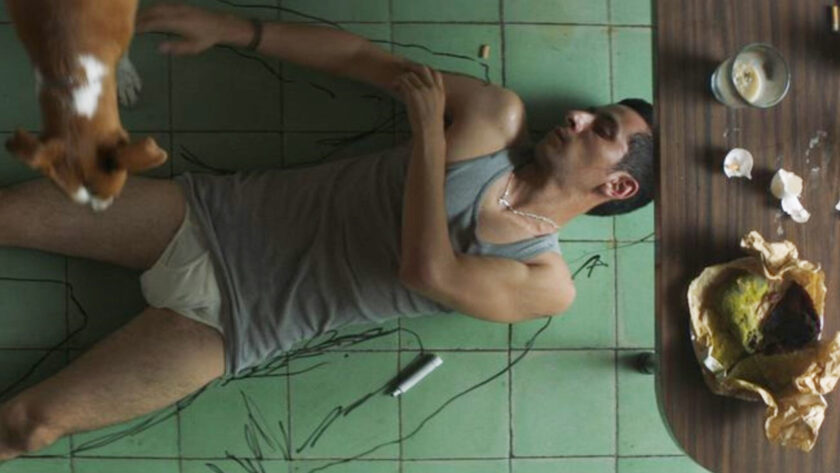Bryn Chiappe appreciates the distinct style of filmmaking in this Silver Bear Award-winning documentary.
Alonso Ruizpalacios’ Una Película de Policías is a bold attempt at reworking the documentary film format, pushing the formalistic principle of reenactment to an extent that makes the story one littered with misdirection and disorientation. At times it feels genius. At other times, merely a source of unnecessary confusion. The film begins by following Maria (known as Teresa), a police officer in Mexico City, before moving on to the story of Jose (known as Montoya). We hear them explain why they joined the police force and what their daily lives consist of, and it is revealed that they fell in love after meeting in a squad car on the way to a raid. They became partners and began to work as a pair, affectionately dubbed ‘The Love Patrol’ by their co-workers. Up until this point, the story has been told through the format of interviews and action sequences that often blend into each other, with the interview moving from off-screen narration to on-screen fourth-wall-breaking dialogue.
The style feels fresh and dynamic, but the extent of the film’s formalistic ambition is withheld until the fourth section, where the story of The Love Patrol disappears. The people who we thought were Maria and Jose are revealed to be actors when we begin following them in the process of preparing to play police officers in Mexico City. It’s all very meta. The form of the film through this section experiments with different cameras and scenarios for dialogue, such as the actors’ self-recorded diaries on their iPhones. After their gruelling experience of a fortnight in the training academy for the police force, the film changes tack again by continuing with Maria and Jose’s story, but only after retrospectively changing tack in revealing that the film has been using a verbatim script from real interviews with the pair. We witness the fall of The Love Patrol, a sequence of events in which their engagement in the corrupt practices of Mexico’s police is superseded in ironic style by the corruption of a government legislator who holds great sway with the “top brass” of the police.
The film is at its most interesting when it engages itself fully with getting inside the head of a police officer in modern-day Mexico City, a city notorious for both crime and police corruption. There’s a strong focus on why people join the police, which more often than not seems to be following in the footsteps of a family member. In the case of Maria, this is something of a subversion of the tendency to merely copy one’s parents, as she speaks with equal pride and sadness about her father’s initial dismissive attitude towards his daughter working in the force while simultaneously teaching his son how to fire a pistol in preparation for a career that seemed preordained. One finds Jose’s idolisation of his brother in the police to be equally powerful, but with less ease about it. He speaks about the joy of holding his brother’s guns when he and the squad car drove through the neighbourhood, and the fear it inspired in his peers. Jose talks about his childhood best friend becoming a convict while he joined the force with a sense of relief with regards to the crossroad his life presented to him as an adolescent.
The interesting thing about all of the discussion regarding joining the police is the absence of people saying they felt a moral obligation to or liked the idea of benefitting society. It all seems to be operating on a totally understandable individualistic basis about commanding respect and escaping a life of crime. It’s no surprise when we learn that Maria and Jose regularly illicit bribes – they’re merely pawns in a broken, self-perpetuating system. Maria breaks down the police salary at one point and explains that after all the bribes that an officer is all-but required to pay to various other members of the force in order to secure a working gun, a car, a safe bullet-proof jacket and clean uniform, they are left with a pittance that must be subsidised by extorting members of the public. The whole thing makes you feel fairly nauseous as a viewer, but it’s refreshing in the present climate to see an image of the police that humanises the individuals who comprise the force whilst exposing the sickness and rot at the heart of the institution. People who join corrupt police forces aren’t evil, but the framework of the organisation they’re operating in is. When the decision comes down to challenging the broken system and not being able to make a living or staying silent and copying everyone around you, it’s easy to see why corruption in the police is impossible to eradicate without reforming the “top brass”.
However, the film has issues in that it seems to be so pleased with its formalistic techniques that the insight into the police force falls somewhat by the wayside. The misdirection serves a dramatic function occasionally, but the very intentional sense of a twist that comes with the reveal of Maria and Jose being played by actors is one that surprises the viewer initially and only later comes back to them with a resounding question – why? The story isn’t heightened by it at all, and if the only benefit is the section in which we see the experience of the police training academy then it begs the question of whether the concealment of the film’s reenactment was the only route to including this in the film. The formalistic experimentation is interesting in and of itself, but it feels like it’s been grafted onto the story that the film is actually trying to tell with very little regard for the relationship the two have to each other. In the process of this awkward commitment to style over substance, the film loses its sense of urgency in conveying a message and ultimately comes to the position of not having said anything particularly groundbreaking. I hope to see the same principles applied to real-life stories in future, as the fundamental idea behind it bodes great promise for shaking documentary filmmaking from its hyper-formulaic mode, but sadly in the case of this story, it feels as if Ruizpalacios jumped the gun on putting his ideas into practice. The story is interesting and so is the style, but their relationship is an estranged one.




